Why Recycle?
Recycling of materials is not an option, or the preserve of the ‘alternate lifestyle’ society anymore; recycling is an obligation for each and every living person.
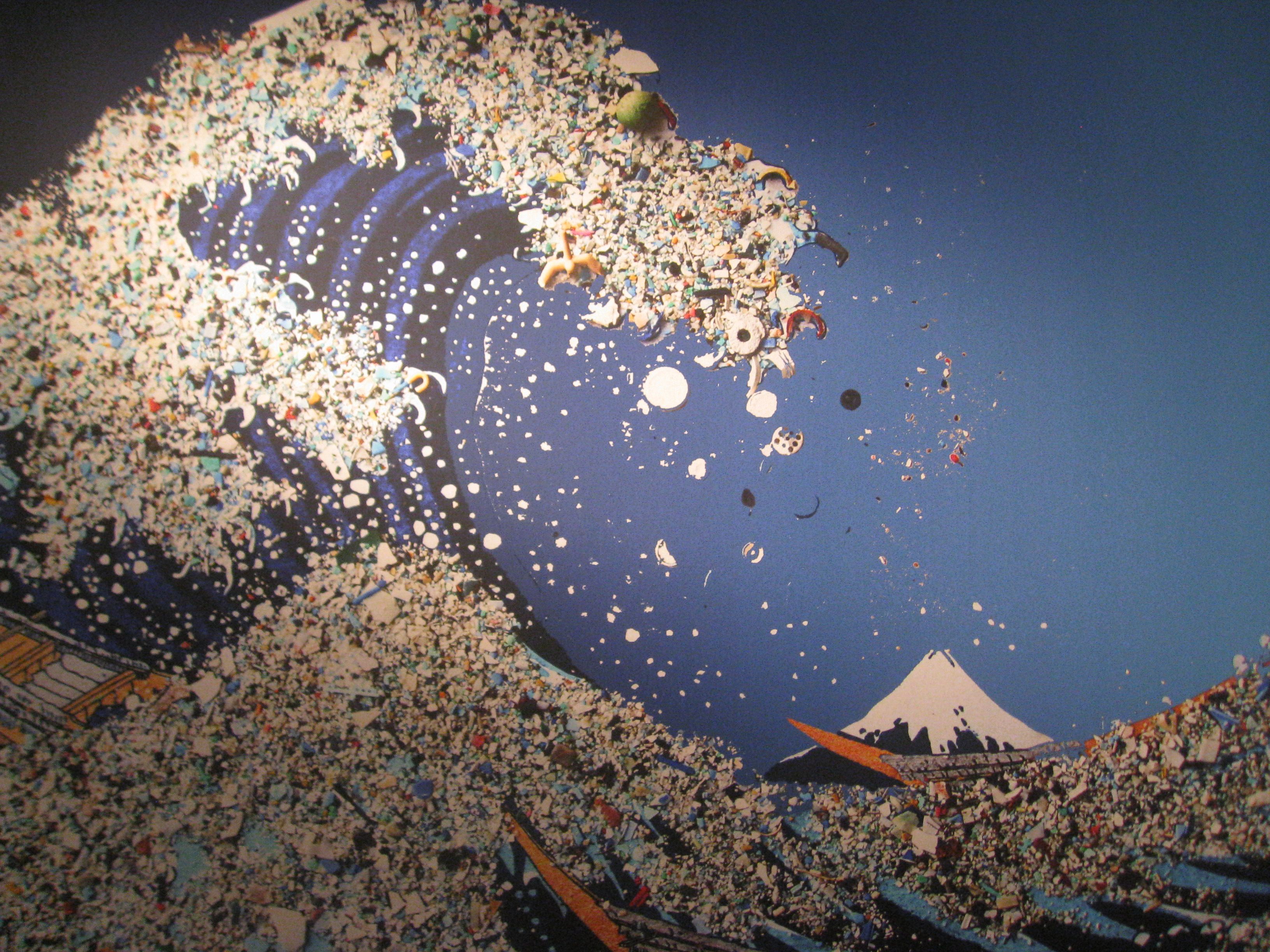
The great garbage Tsunami
recycling is an obligation for each and every person
Our world is inexorably lurching ever closer to an apocalypse fueled by climate change that is in itself fueled by the ever growing demand for the Earth's natural resources.
In this article I want to discuss the benefits of recycling waste specifically as one way in which everyone can help to save our world.
Why should we recycle waste products?
Well, here are some reasons:
- 1. Save Energy
- Did you know that recycling helps to save energy? That's because reusing and repurposing recyclable materials means that manufacturers can produce and manufacture products without using more raw materials that deplete natural resources. Using recycled materials helps to save on energy consumption and reduce production costs, so everybody is happy.
- 2. Reduce landfill use
- When we recycle more, we send less waste to landfills. This stops existing landfills from overflowing that force new ones to be opened. That means a better living space for everyone in the community, because no one wants to live next to a landfill.
- 3. Protect wildlife
- Recycling helps to maintain good biodiversity. Recycling paper for example, allows us to cut down on the number of trees required to make paper, so that means more homes for wildlife. Proper waste disposal and segregation of recyclable materials also means less trash polluting the oceans, so we can protect marine ecosystems.
- 4. Do your part to fight climate change
- Overall, recycling allows all of us to take part in the battle against climate change. By making use of recyclables, the reduced pollution allows us to make
our carbon footprint smaller. In the long run, this also reduces the amount of unhealthy greenhouse gas emissions.
Now if everyone just did it, right? - 5. Good for the economy
- Recycling isn't just for the environment and wildlife, it's also good for the economy. Producing goods using recycled materials means less waste and pollution while consuming less water and energy. Plus, the production of recycled goods also creates more demand for them, as more and more people are encouraged to opt for the eco-friendly alternative.
Not everyone is helping the planet by recycling
It is a sad fact that there are many people all around the world who are not recycling, many because, for various reasons, they can't, and many more who just won't believe it is necessary.
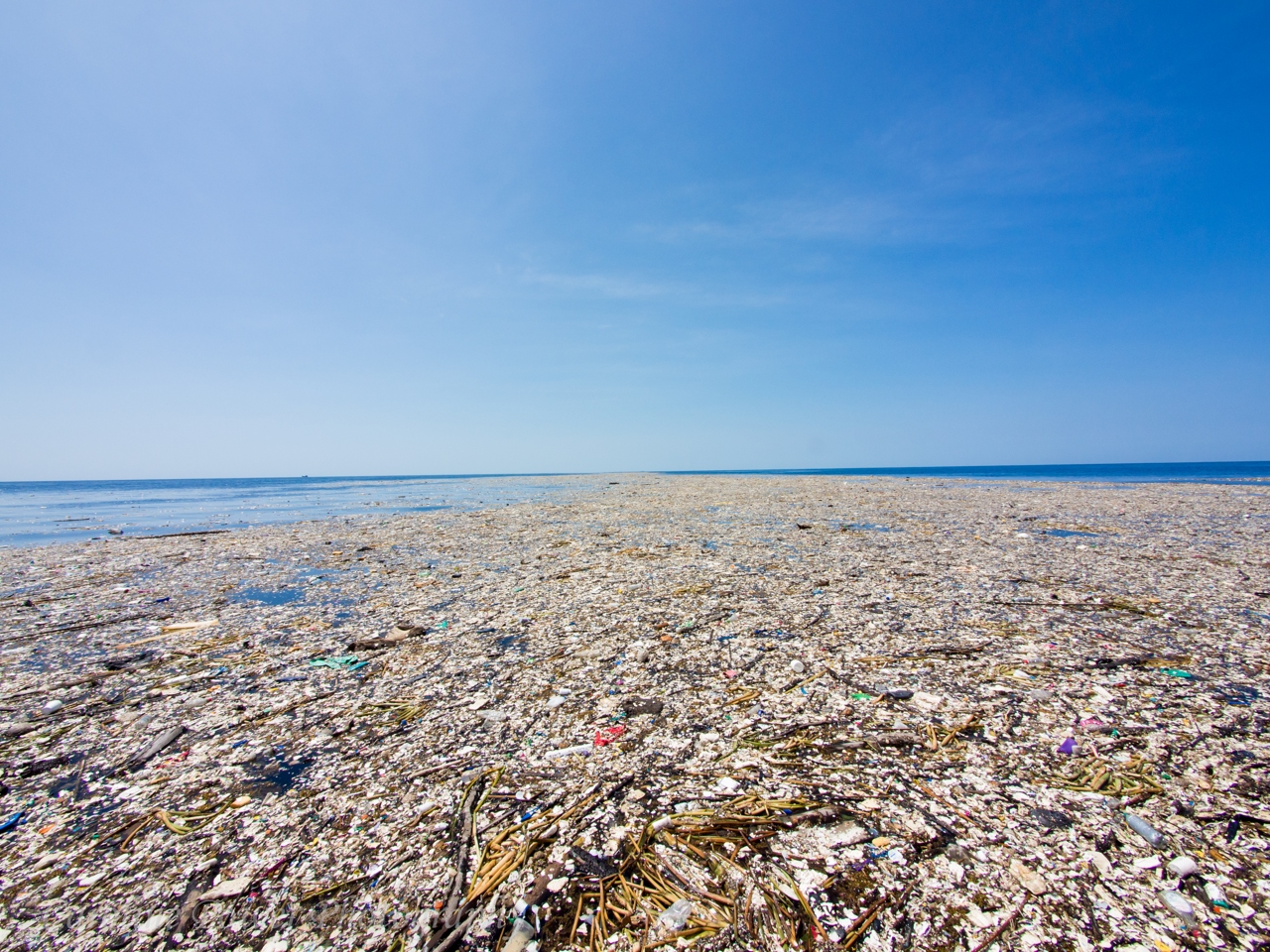
The great pacific garbage patch
Whilst researching this article I was dismayed to find yet more online groups - chock full of conspiracy theorists, climate change deniers, or U.S. Second amendment psychos - who fervently believe that talk of plastic pollution in our oceans is a lie, even denying the existence of those gigantic floating islands of waste in our oceans, such as the 'Great Pacific garbage patch', that is estimated to be twice the size of France.
Even in the face of overwhelming evidence to the contrary there are still many people who believe that oceanic plastic pollution is a hoax, such as those in the Physicians For Civil Defence organisation; in their article, The Great Pacific Plastic Hoax.
Despite what we may think of them, many of these people - not all though - are not uneducated or stupid; I am just at a loss to understand their point of view.
I can only put these people into the same category as the Holocaust deniers, the anti-vaxxers, the flat-earthers, climate change deniers, the "everything is a Government conspiracy" theorists, and other head-in-the-sand waccos, all of whom seemingly need to take the exact opposite stance to overwhelming empirical evidence, on any topic, just because they can, or they believe it is their inviolable 'right' to do so.
Anyway, rant over, back to the topic in hand.
So why are so many people around the world not recycling their waste? Here are some reasons.
Five Reasons People Don't Recycle
1. It's inconvenient
The reality is that many residential areas are located far from recycling pick-up points, so homeowners have to make a bit of a trek from their driveway. For some, this is inconvenient and keeps them from recycling like everyone else. But we all know that gathering items for recycling and making that short trip to the nearest pick-up point is a small price to pay for a greener planet, right?
2. No space
Recycling at home means having separate bins for segregating different waste materials. Unfortunately, for some, hanging on to recyclables for a few days means taking up space or dealing with an eyesore. On the upside, there's a simple fix for that-you can stay clean and organized at home by keeping recyclables in a separate bin that you can easily empty on collection day. The little space that separate bins take up is a great way to keep track of garbage at home.
3. I'm not being paid to recycle
Sadly, a lot of people don't recycle because they're not getting paid to do it. While some places pay people a small amount for rounding up used bottles for recycling, the incentive just isn't that great for some. But do we really need to get paid to look after our waste, make sure it's disposed of properly, and make an effort to separate the recyclables? Not only does recycling help you live a better, greener life, but also, when done right, you can even save money as you find objects to repurpose. Now, who said recycling doesn't pay?
4. It doesn't make a difference
Another reason why people don't recycle is simply that they think that there's no more hope left.
For them, there's no point in recycling because they've heard that landfills are now overfilled and climate change is irreversible. But what's going to happen if all of us
just gave up on recycling? The fact is that refusing to recycle and live an eco-friendly lifestyle will only speed up all the environmental decline, leaving us in dire
conditions much sooner.
5. It's too hard
It sounds infuriating, but some people can't be bothered to recycle just because they think it's hard. We know no-one gets those bins right the first time, but that doesn't mean you should stop there. Sure, figuring out where plastic, paper, and organic waste goes can sound daunting at first, but it gets easier, and there are a ton of recycling guides out there to help you get started.
Non-existent recycling infrastructure
In many parts of the world sufficient, suitable recycling facilities just don't exist. Recycling is expensive, so many countries rely on landfill or waste dumps and many people just dispose of their waste in the nearest water course.
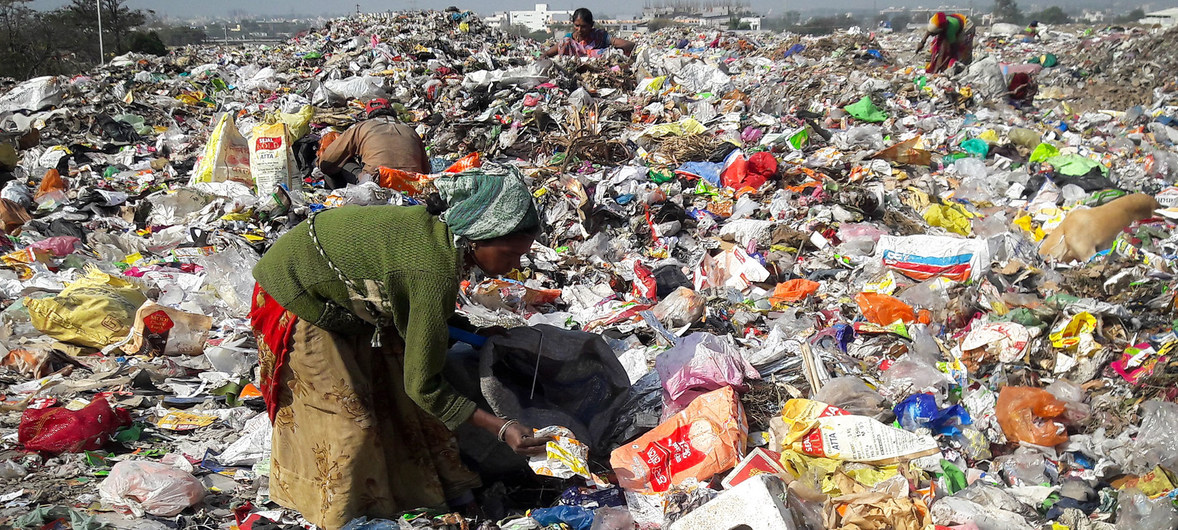
Photo: UNDP
Waste pickers on landfill site in India
Why do I believe we need to recycle waste materials?
Well, the stark fact is, humanity is currently stripping the earth of its natural resources at an alarming and unsustainable rate; this includes minerals, animals for food, and drinking water; the waste we produce is contaminating the land we live on, our seas and oceans, and killing wildlife, and bringing disease and even early death to many people.
Why is it important that we recycle?
The resources we waste
Recycling a single aluminium can will save enough energy to power a TV for up to three hours or an iPod for up to twenty hours.
Recycling everything you can in your kitchen recycling bins could power a TV for six months.
Recycling a single glass bottle will save enough energy to power a laptop for half an hour.
Recycling a single plastic bottle will save enough energy to power a lightbulb for three hours or more.
Recycling five plastic bottles creates enough insulating fibre to fill a ski jacket.
It takes 70% less energy to recycle paper than it does to make it new from raw materials.
UK households create 7m tonnes of food waste each year, that's a kilo of food for every person on the planet.
It is believed that 50% of all food waste is still edible, and could be 'recycled' through food banks, charity outlets, and making animal feed.
It takes about one hundred buckets of water to create just one loaf of bread, and six buckets of water to grow one potato.
50% of the food waste we throw in the bin could be composted.
As much as 80% of the things thrown away could be recycled.
Even cars can be recycled, with up to 80% of the vehicle being re-used.
More than 15% of the money we spend on products pays for packaging - most of which ends up in the trash.
It is estimated that over 600m batteries are thrown away in the UK each year.
Only 27% of batteries are recycled in the UK, resulting in more than 20,000 tonnes of battery waste going straight to landfill.
It takes fifty times more energy to make a battery than the finished product produces.
The UK disposes of around 80 million fluorescent tubes each year. If these were to be recycled we could re-use up to 4 tonnes of mercury - a natural resource.
Waste Electrical and Electronic Equipment (WEEE) is the fastest growing waste stream in the UK.
According to the Waste and Resources Action Programme (WRAP), 25% of our Waste Electrical and Electronic Equipment (WEEE) waste could be repaired and re-used.
Most of the two million TV sets discarded each year in UK end up landfill sites, despite being accepted at many recycling centres across the country.
These facts from the United Kingdom might make you think twice about what you throw away:
It is vitally important to recycle, correctly and safely, items that contain hazardous materials or those that contain rare metals; hazardous materials can return to us through soil pollution or through leeching into water resources. Rare metals are often mined in poorer countries where safety of the miners is ignored, or mining is done illegally, meaning that there is NO safety at all for miners, many of whom are young children.
Before we look further into recycling, a couple of facts about the Earth's water resource.
FACT:
Only about 3% of the water on earth is useable by humans for drinking, and less than 1% of that is readily available, the rest being found in permanent ice or deep within the ground.
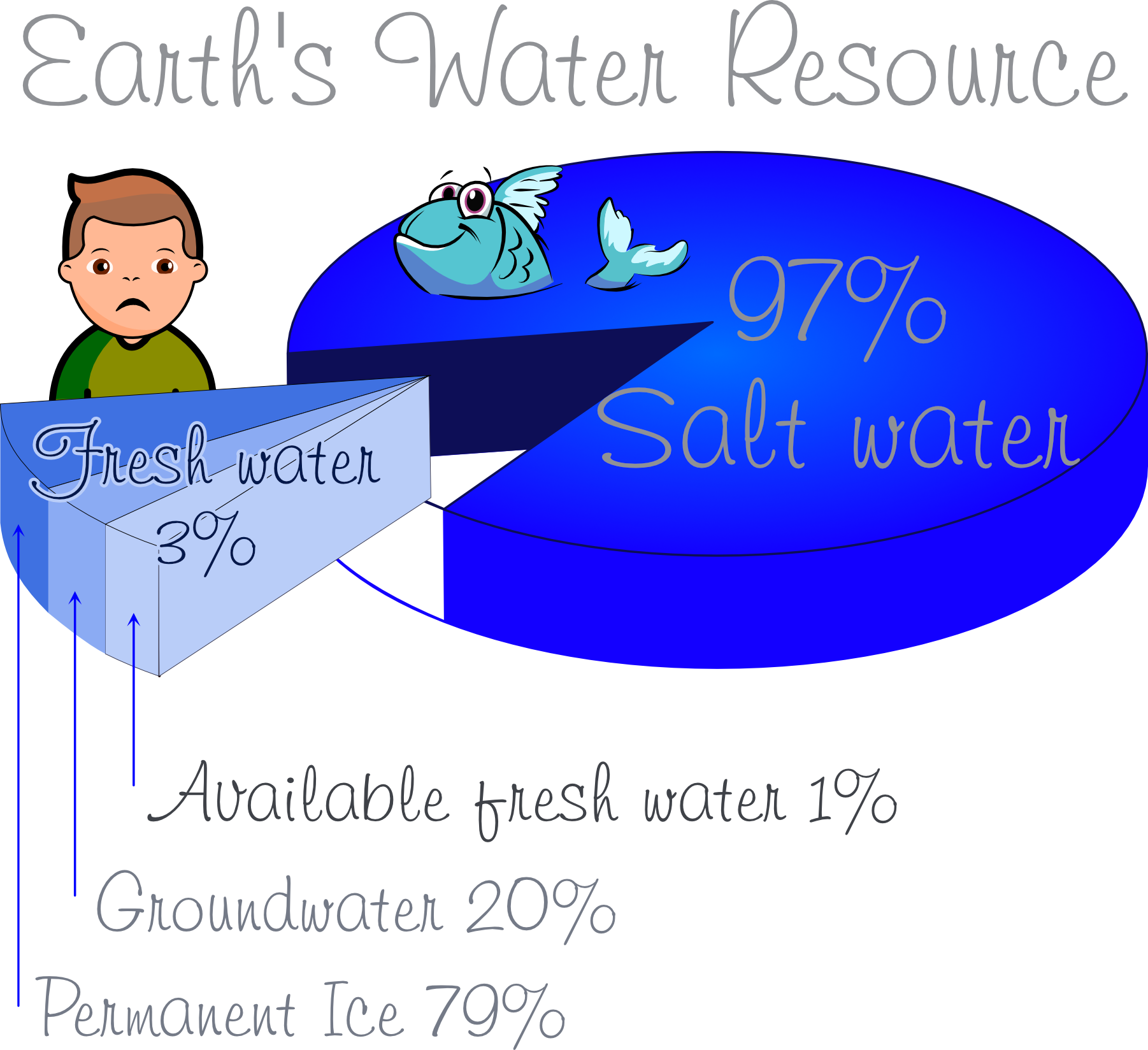
Earth's Water resources - only about 3% useable by humans
FACT:
Some 2.2 billion people around the world do not have safely managed drinking water;
4.2 billion people do not have safely managed sanitation services;
and 3 billion lack basic handwashing facilities.
‘Water, water everywhere, nor any drop to drink’
from The Rime of the Ancient Mariner by Samuel Coleridge Taylor
Water is a precious resource and humanity is 'wasting' vast quantities of water on a daily basis through pollution of all kinds, whilst many parts of the world are suffering chronic water shortages.
To read more facts about the Earth's Water crisis, see our article: Water, our precious resource
Plastics
Plastics, once hailed as the wonder material for everyday items, have become one of our biggest burdens. The amount of plastic used is increasing year-on-year and little seems to be being done to kerb its relentless march.
The world produces a million plastic bottles a minute - many for water. That's 500 billion in a year! A substantial amount of these plastic bottles are ending up in the World's fresh water sources and oceans.
“The ultimate goal is to change the mindset about plastics. What was once the answer to every household's endless supply of dirty dishes, is now the problem washing up on every shore in the world, showing up in the stomachs of every animal, and poisoning our waterways.”
PlasticTides.org
Classification of Plastics
Plastics are classified into one of seven categories, each one a different material that is easier or more difficult to recycle.
1 = PET, Polyethylene Terephthalate, and is widely recycled.
2 = HDPE, High-Density Polyethylene, and is also widely recycled.
3 = PVC, Polyvinyl Chloride, and is capable of being recycled but harder to do so, so check with your local waste management authority.
4 = LDPE, Low-Density Polyethylene, also capable of being recycled, but check with your waste management authority.
5 = PP, Polypropylene, hard or not possible to recycle, so try to reuse or avoid it. PP is used in tupperware, disposable cups, and some food containers.
6 = PS, Polystyrene or Styrofoam, hard or not possible to recycle, so try to reuse or avoid it. PS is used in disposable coffee cups, plastic cutlery and packing foam.
7 = other. This is usually a mix of lots of different plastics and is pretty tricky to recycle.
Easily Recyclable!
Dispose of these plastics legally and responsibly - don't dump them!
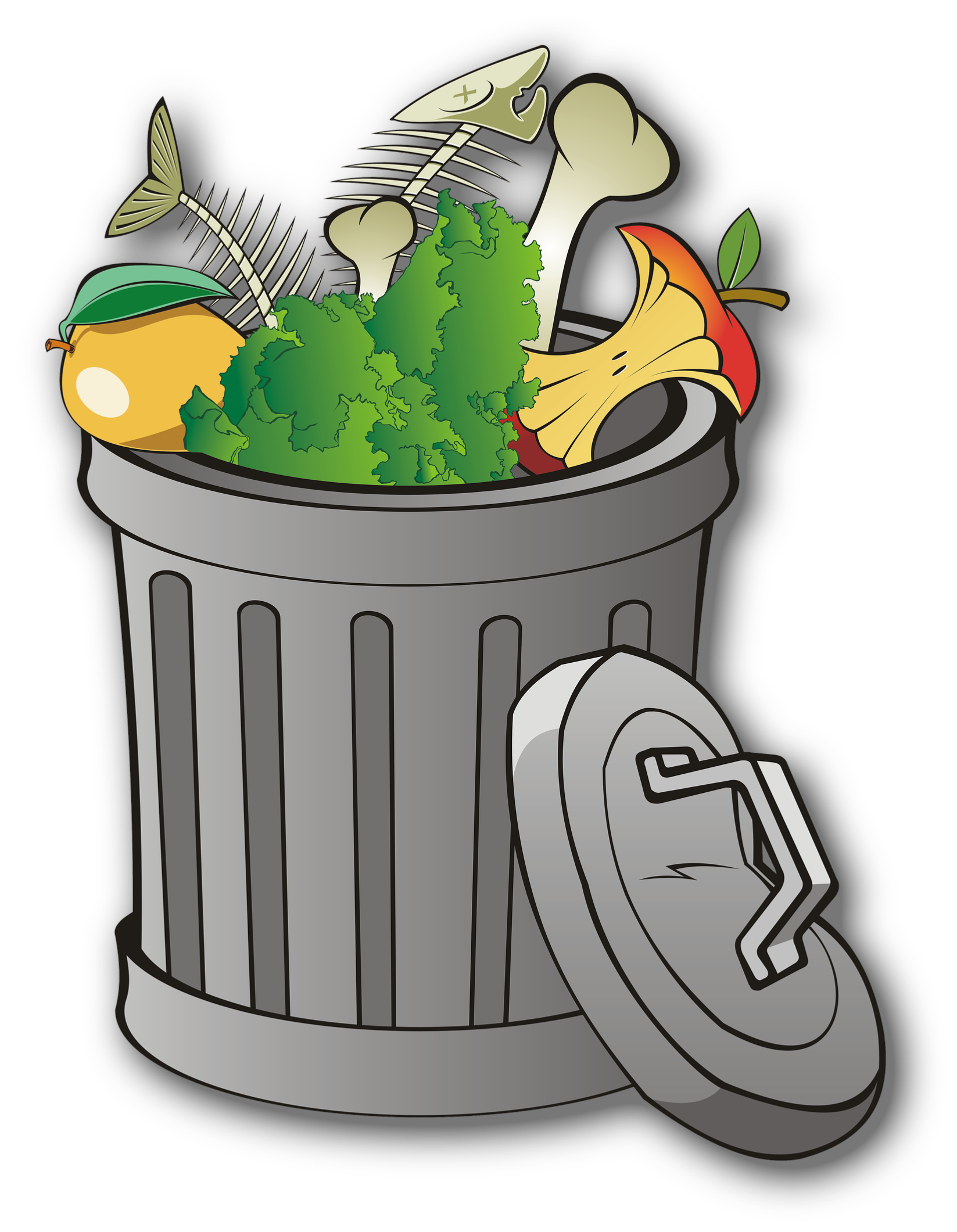
Food Recycling Facts
The average UK household throws away 20% of all food purchased.
Around 8 million people in the UK are struggling to afford to eat, yet UK households throw away around 7 million tonnes food every year.
This equates to around £700 per household in food waste - the average cost an annual utility bill.
Of the 7 million tonnes thrown away, 250,000 tonnes is perfectly edible and could be used to make up to 650 million meals for those in need.
The average person throws away 74kg of food waste each year, the weight of over 1000 banana skins.
Most of the food that ends up in landfills could be recycled to make animal feed, or even energy by converting the gas it releases into electricity and heat.
At least 50% of food waste could be composted.
Waste cooking oil is one of the most common causes of water pollution.
1 litre of used cooking oil can pollute up to 1 million litres of water drinking water.
The UK throws away:
- 1 million untouched bananas every day.
- 3 million unopened yoghurts each day.
- 600,000 whole uncooked eggs every day (that's 300,000 omelettes!).
- 2 million untouched sausages.
- 20 million slices of bread every day.
What is the problem with throwing food waste away?
We use 25% of the worlds fresh water supply to grow food that we will send to the landfill.
We could feed over a billion hungry people with less than a quarter of the food wasted in the UK, the United States, and Europe.

In the landfill, food waste releases methane, a damaging greenhouse gas.
We can cut our CO2 emissions and reduce our carbon footprint by up to 25% by simply recycling or composting our food waste.
It is estimated that we waste more than 30% of all food produced globally.
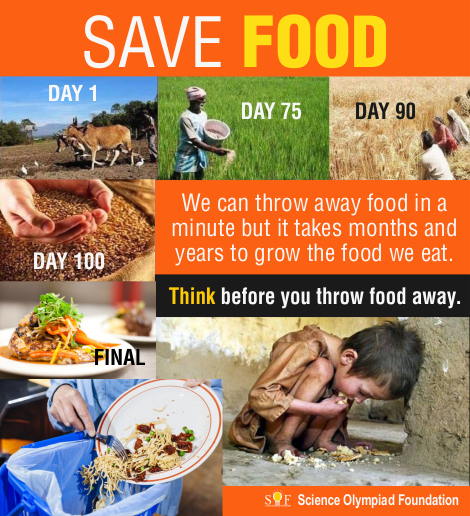
Comment:
At United Global Human we are commited to upholding the principles and practice of recycling. We believe that it is an imperative in the
fight to save our planet for future generations.
We urge all people to abide by the principles of recycling and to join the global fight against unnecessary waste. Do your bit, no matter how insignificant
it may seem to you, because 'every little bit of recycling helps'.
References
Edukational Restaurant Article: Plastic Crisis
Pysicians For Civil Defence: Pysicians For Civil Defence
Heartland Daily News: https://heartlanddailynews.com/category/health-care-news/
Plastic Tides: plastictides.org



